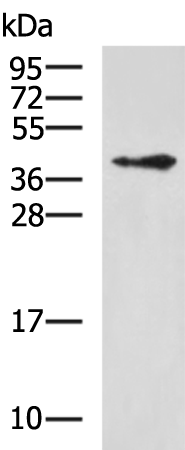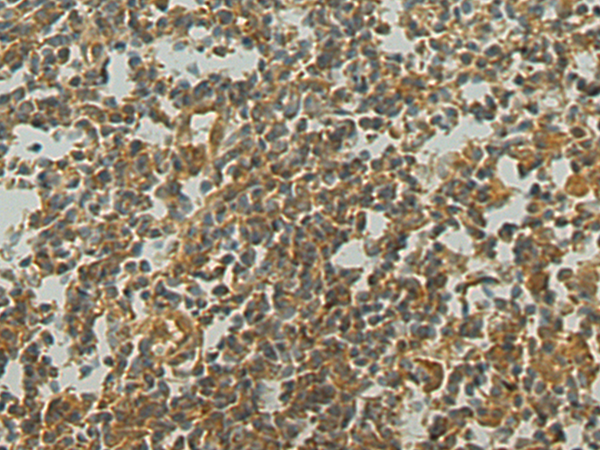

| WB | 1/500-1/2000 | Human,Mouse,Rat |
| IF | 咨询技术 | Human,Mouse,Rat |
| IHC | 1/100-1/300 | Human,Mouse,Rat |
| ICC | 技术咨询 | Human,Mouse,Rat |
| FCM | 咨询技术 | Human,Mouse,Rat |
| Elisa | 1/5000-1/10000 | Human,Mouse,Rat |
| Aliases | p44; MEP50; MEP-50; HKMT1069; Nbla10071; p44/Mep50 |
| WB Predicted band size | 37 kDa |
| Host/Isotype | Rabbit IgG |
| Antibody Type | Primary antibody |
| Storage | Store at 4°C short term. Aliquot and store at -20°C long term. Avoid freeze/thaw cycles. |
| Species Reactivity | Human, Mouse, Rat |
| Immunogen | Fusion protein of human WDR77 |
| Formulation | Purified antibody in PBS with 0.05% sodium azide and 50% glycerol. |
+ +
以下是关于WDR77抗体的3篇参考文献及其摘要概括:
---
1. **文献名称**:*WDR77 is a key regulator of prostate cancer progression via PRMT5-dependent methylation*
**作者**:Chen et al.
**摘要**:该研究揭示了WDR77通过与PRMT5形成复合物调控前列腺癌细胞增殖和转移的机制。利用WDR77抗体进行免疫沉淀和染色质分析,发现其通过精氨酸甲基化修饰靶基因启动子区域,驱动肿瘤生长。
2. **文献名称**:*MEP50/WDR77 in the PRMT5 complex is essential for pluripotent stem cell differentiation*
**作者**:Liu et al.
**摘要**:研究利用WDR77抗体在小鼠胚胎干细胞中验证其与PRMT5的相互作用,证明WDR77通过调控组蛋白甲基化参与干细胞多能性维持及分化过程,缺失WDR77会导致分化异常。
3. **文献名称**:*WDR77 promotes non-small cell lung cancer metastasis through stabilizing EGFR signaling*
**作者**:Wang et al.
**摘要**:通过WDR77抗体的免疫组化分析,发现WDR77在肺癌组织中高表达,并通过稳定EGFR蛋白增强下游信号通路活性,促进肿瘤侵袭和转移,提示其作为肺癌治疗潜在靶点。
---
以上文献均以WDR77抗体为核心实验工具,聚焦其在不同癌症中的分子机制研究。
The WDR77 antibody is a crucial tool for studying the WD repeat-containing protein 77 (WDR77), also known as MEP50 or androgen receptor cofactor p44. WDR77 is a conserved scaffolding protein characterized by WD40 repeats, which mediate protein-protein interactions. It plays diverse roles in cellular processes, including transcriptional regulation, RNA processing, and chromatin remodeling. Notably, WDR77 forms a complex with protein arginine methyltransferase 5 (PRMT5), functioning as a methyltransferase module that catalyzes symmetric dimethylation of histones and other proteins, influencing gene expression and cell cycle progression.
Research highlights its involvement in development and disease. WDR77 is essential for embryonic development and spermatogenesis, while dysregulation is linked to cancers (e.g., prostate, lung, and breast cancers) due to its role in promoting cell proliferation and survival. The antibody enables detection of WDR77 expression, localization, and interaction partners in techniques like Western blotting, immunohistochemistry, and co-immunoprecipitation. Validated antibodies help investigate its oncogenic mechanisms, such as modulating androgen receptor signaling in prostate cancer. Host species (e.g., rabbit, mouse) and epitope specificity vary across commercial antibodies, requiring validation via knockout controls. Its study contributes to understanding epigenetic regulation and potential therapeutic targeting in malignancies.
×